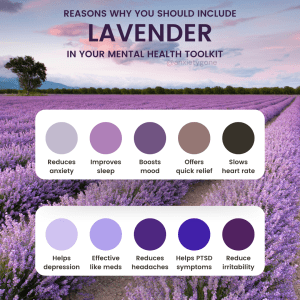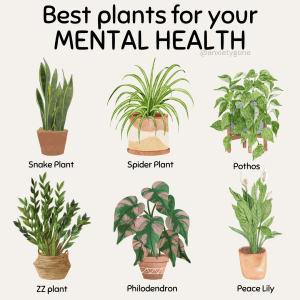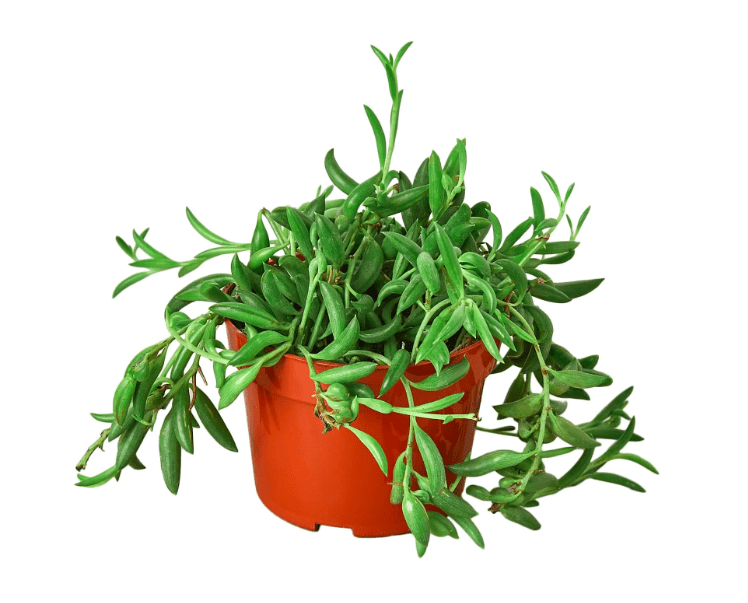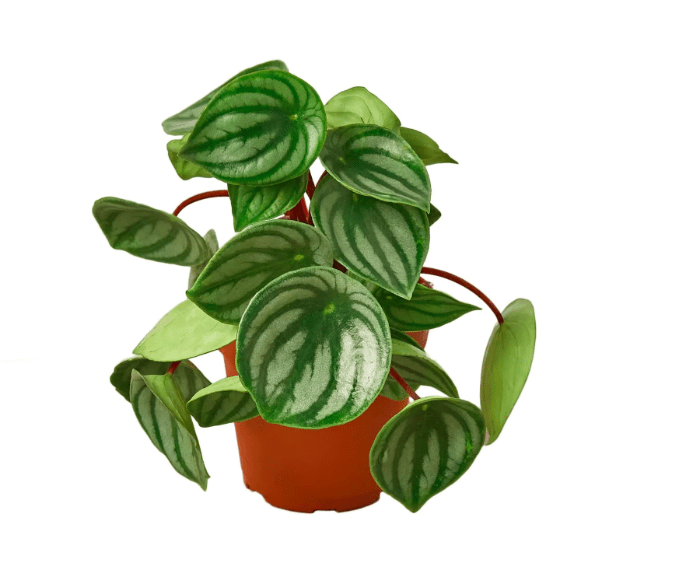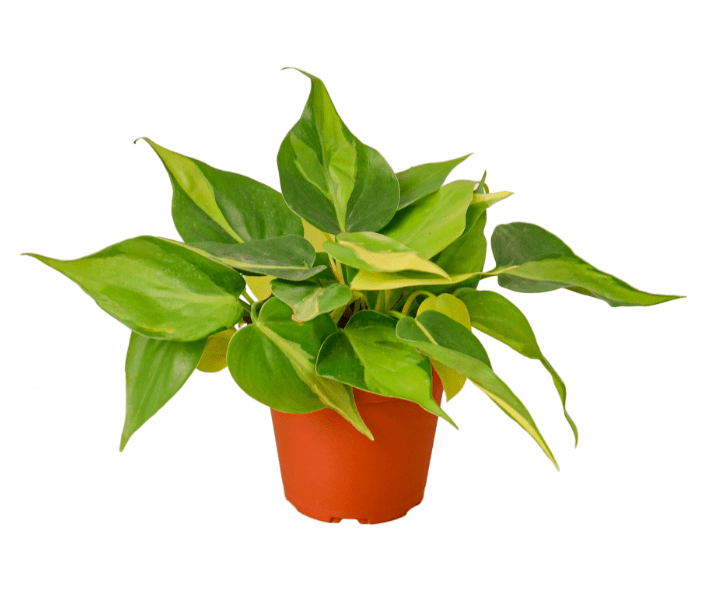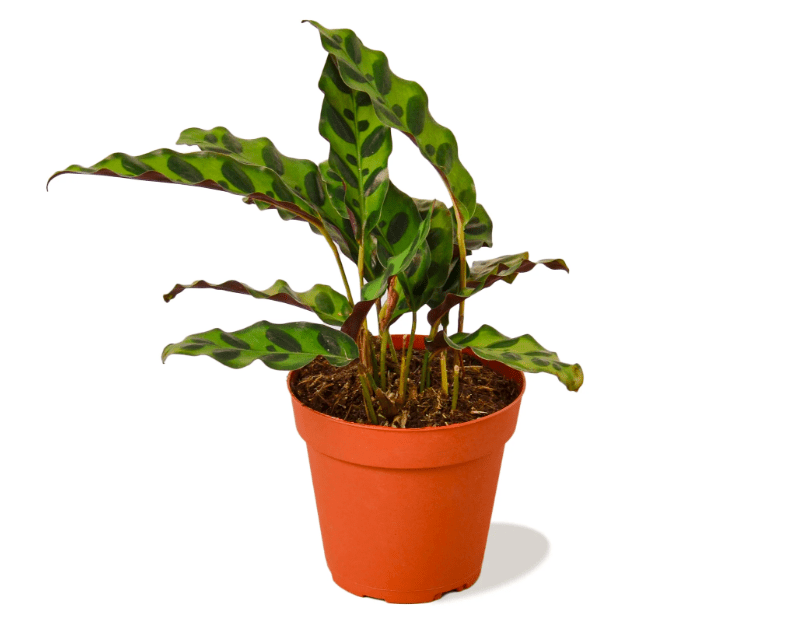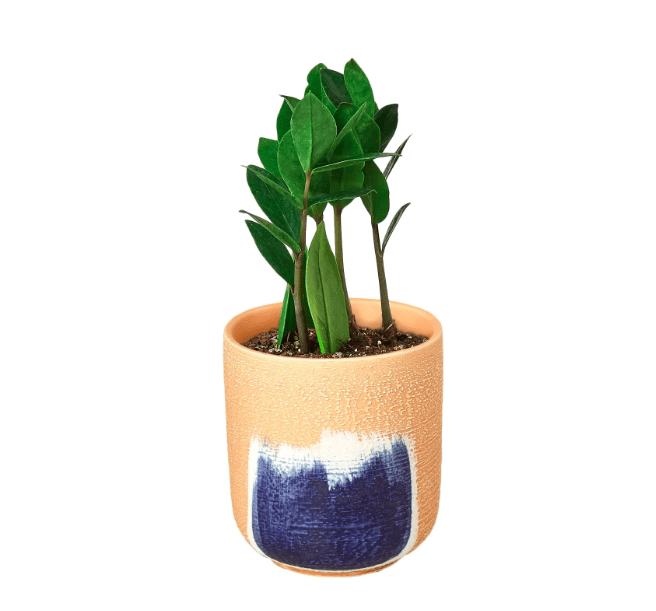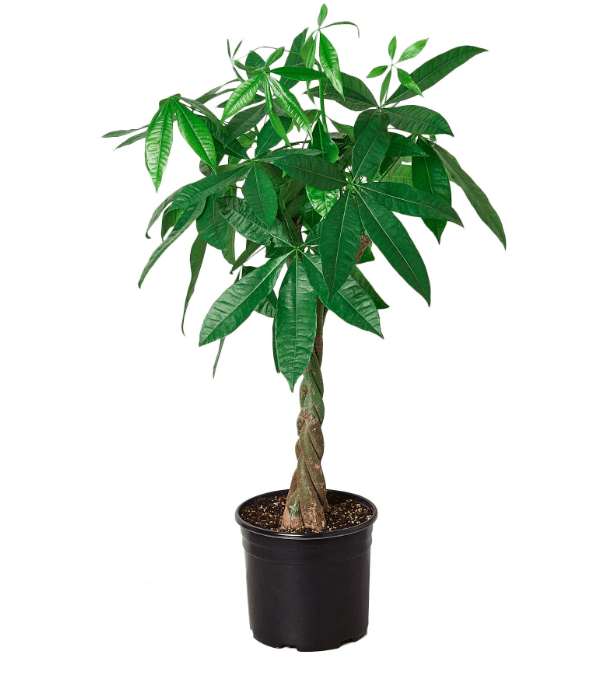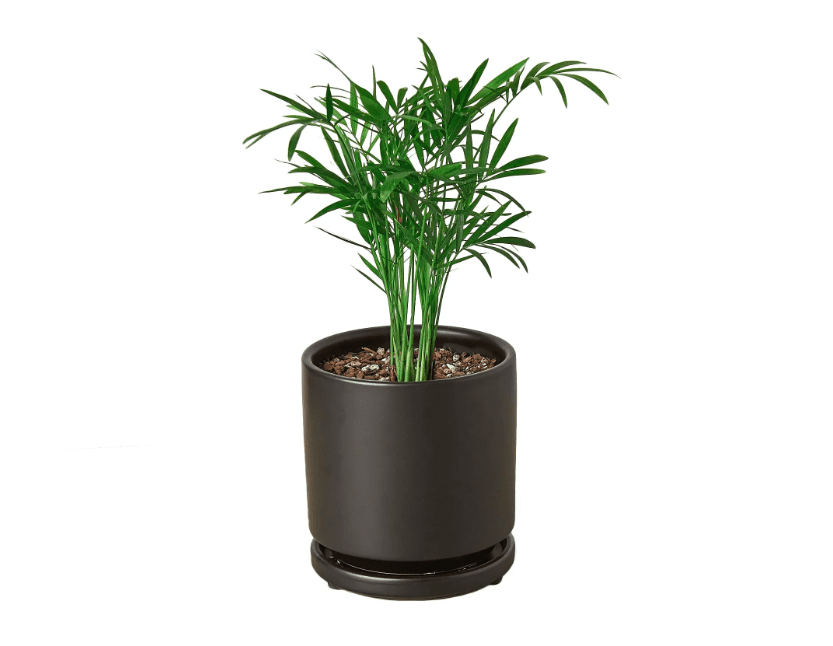Full Disclosure: Clicking on these links could mean a tiny commission for me, at no extra cost to you.
Peace of mind often starts with the right atmosphere and what better way to calm your nerves than with a few new leafy, green companions? From the subtle scent of lavender to the soft sway of a spider plant, these mood-boosting botanicals brighten so much more than just a room. Whether you’re a seasoned gardener or just dipping your toes into the soil, there are all kinds of plants for anxiety and depression, and just creating a space that feels safe, soft, and soothing.
Reasons Everyone Should Own a Plant for their Mental Health
Bringing plants into your home will liven up your decor while also offering support for your mental health in subtle but powerful ways. Studies confirm that indoor greenery can reduce cortisol levels, boost mood, and even improve concentration. Plants also purify the air, introduce a gentle routine of care, and provide a sense of purpose and peace. There’s nothing like finding a new pup or leaf starting to grow.
You can check out our full breakdown of all the mental health benefits of houseplants in this guide if you want the deeper science behind the green.
Some of the top benefits of having plants in your home include:
- Promotes better sleep by balancing humidity and oxygen levels
- Naturally reduces stress and anxiety levels
- Boosts your mood and emotional well-being
- Improves air quality and oxygen flow
- Helps with focus, memory, and productivity
- Adds a calming visual element to your space
- Creates a sense of purpose and routine through plant care
The Most Calming Plants For Your Home
All house plants are lovely, in their own way. However, there are specific plants for anxiety that will give you everything you’re looking for and more. Some have calming scents, whereas others purify the air, and all of them are effortless hard-to-fill plants. The last thing you want is a plant that stresses you out!
1. Pothos Plants for Easy Peace
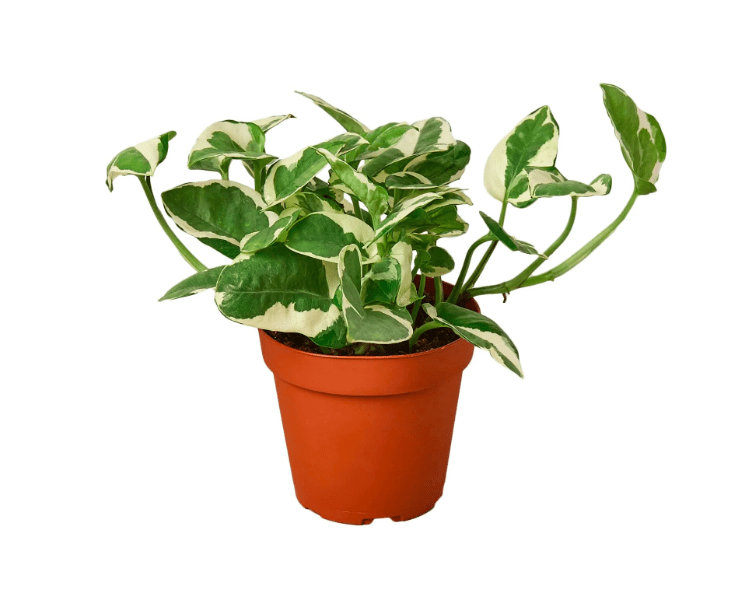
Pothos plants are cute and Instagram-worthy, air-purifying plants that grow into beautiful vines. They’re great for fighting off nasty air pollutants like formaldehyde, benzene, and carbon monoxide, and can even get to get rid of stinky odours. This helps you breathe better and feel better too.
- Purifies the air by removing pollutants like formaldehyde, benzene, and carbon monoxide
- Helps eliminate odors
- Easy to care for and low-maintenance
- Can be propagated easily to create more plants
- Can be grown in a variety of settings, including hanging baskets, pots, and trellises
- Studies suggest that interacting with plants can have positive effects on mental health and stress levels.
Unfortunately, this plant is not pet-friendly.
Fast, Affordable Therapy and Medication
Medication and therapy work better together — and Hims/Hers make getting support simple. Connect with licensed providers online, receive personalized treatment plans, and access medication — all from the comfort of home. No long waits, no stress — just expert care made easy.
2. Succulents For Stress-Free Greenery
Did you know that keeping a succulent in your space can actually help you feel less stressed and more positive? It’s true! Scientific studies have shown that houseplants for anxiety, including succulents, can help reduce both psychological and physiological stress levels. So, if you’re feeling stressed and overwhelmed, a little succulent might be just what you need to help you relax and feel more positive.
Plus, they are cute and low-maintenance. Here are some additional benefits of succulents:
- Require minimal watering and maintenance, making them easy to care for
- Come in a variety of shapes, colors, and sizes, making them attractive decorative plants
- Can be grown indoors or outdoors, depending on the species and the environment
- Able to tolerate harsh and dry conditions, making them ideal for drought-prone areas
- Produce oxygen and purify the air by absorbing toxins, improving the quality of the indoor air
- Can be propagated easily through cuttings, making them affordable and accessible to grow
- Can be used in various ways, including as medicinal plants, culinary ingredients, and ornamental displays
- Can help prevent soil erosion due to their deep root systems and ability to retain water
- Are known to have a calming effect and can help reduce stress and anxiety, providing mental health benefits
Generally, most succulents are safe for pets, but some varieties can be toxic.
3. Peperomia For Pet-Friendly Homes
If you’re looking for indoor plants for anxiety and mental health that are equally as magical as they are beautiful, peperomia is it. These indoor plants are ideal for keeping the energy, air, and atmosphere in your home ideal for mental health. They reduce carbon dioxide levels, increase humidity, reduce certain pollutants, keep air temperatures down and reduce dust.
Peperomia also has a range of health benefits, such as soothing stomach aches, reducing inflammation of acne and boils through a topical tincture, boosting the healing process, providing pain relief, curing headaches, treating Rheumatoid Arthritis, aiding with kidney function, providing antifungal effects, and working as an antioxidant.
Here’s a quick recap of the benefits:
- Has been used for centuries in Bolivia as a wound dressing to stop hemorrhage
- Has numerous medical benefits, including lower cholesterol levels and fewer infections
- Soothes stomach aches
- Reduces inflammation of acne and boils through a topical tincture
- Boosts the healing process
- Provides pain relief
- Cures headaches
- Treats Rheumatoid Arthritis
- Aids with kidney function
- Provides antifungal effects
- Works as an antioxidant
Peperomia plants are generally considered pet-friendly and non-toxic to both cats and dogs.
4. Air Plants for Anxiety Relief
Certainly by now, you’re seeing a theme: easy stress relieving houseplants for anxiety. Air plants are definitely on the list of the best plants for anxiety relief because they’re beautiful and incredibly easy to take care of. After all, you just have to soak them in a cup of water once a week.
As for the mental health benefits of air plants, they’re just as awesome. They’re super low-maintenance and help reduce carbon dioxide in the air while also removing chemical pollutants and adding oxygen back into the air to help you breathe better.
5. Bird’s Nest Fern Filter Out Toxins
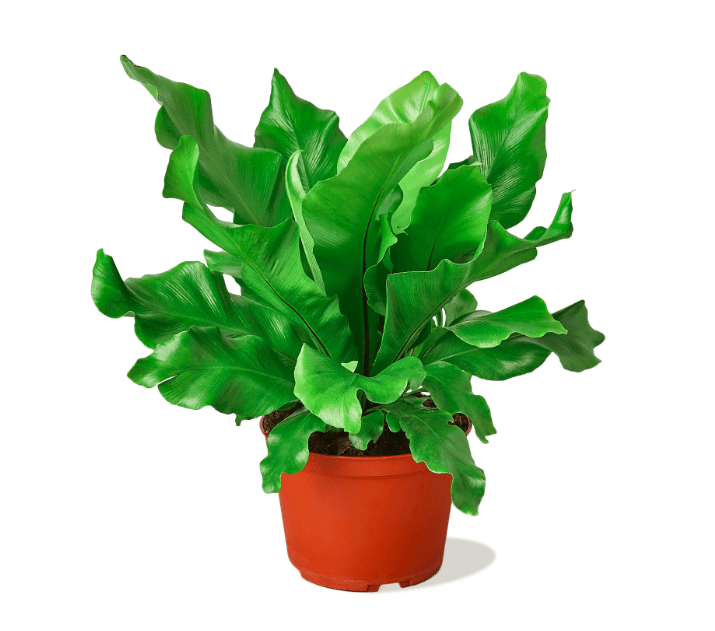
The quality of air in our homes can have a significant impact on our mental health, and addressing this challenge can be crucial. Fortunately, ferns are a great solution as they work like a good humidifier and can help alleviate stress by adding moisture to the air and improving breathability. They filter formaldehyde, xylene and toluene from the air which, as you already know, is key to using plants to boost your mental health. Plus, ferns are beautiful plants that can add aesthetic value to any room when placed in hanging baskets or decorative pots making them the perfect houseplant for anxiety.
Here are the benefits of ferns:
- Remove harmful air pollutants from the environment
- Improve indoor air quality
- Increase humidity levels naturally
- Restore moisture to the air
- Create a soothing effect
- Particularly useful for those living in dry climates or during winter months when heating systems can dry out the air
6. Philodendron Plants Remove Nasty Toxins
Grab some philodendron plants and place them in every 100 square feet of living space for maximum benefits. Philodendrons are known to enhance air quality in homes, making them a great addition to any indoor space. These plants, which are famous for their lush foliage and sprawling, veiny leaves, are not only aesthetically pleasing but also effective in absorbing carbon dioxide and other harmful toxins from the air.
The plant’s porous oxygenating leaves also help to brighten and freshen the room, creating a visually and atmospherically pleasing environment. In other words, they act as a vacuum, sucking out all the toxins in the air, particularly formaldehyde. So, this is one houseplant for anxiety that is a must!
Here are the benefits you’ll enjoy with Philodendrons plants:
- Enhance air quality in homes
- Absorb carbon dioxide and other harmful toxins from the air
- Porous oxygenating leaves help to brighten and freshen the room
- Ideal for those who want to improve indoor air quality naturally
Philodendrons are not pet-friendly.
7. Calathea Plants are Super Air Purifiers
The calathea plant is an excellent houseplant for anxiety. It purifies the air and generates fresh oxygen, making it a healthy addition to any indoor environment. The plant removes carbon dioxide and releases oxygen, providing a healthier environment for humans.
Additionally, the calathea plant enhances the aesthetics of indoor spaces and helps remove toxins (present in the form of dust), ensuring you and your plant breathe fresh air. For those with dry skin and respiratory issues due to low humidity levels, placing a calathea plant in your room can add moisture and alleviate these issues too.
Here are the benefits of Calathea plants:
- Purify indoor air and provide fresh oxygen
- Promote a healthier indoor environment by removing carbon dioxide and releasing oxygen
- Help remove toxins present in the form of dust
- Add moisture to indoor air, making them helpful for those with dry skin and respiratory issues
These plants for mental health are also kid and pet-friendly.
Advertisement
Ready to Take Control and Start Healing?
Feeling anxious, stuck, or overwhelmed? You don't have to figure it out by yourself. BetterHelp connects you with a licensed therapist who fits your needs, all from the comfort of home.
No waitlists, no commuting, no pressure. Just flexible, professional support designed for real life. With over 20,000+ therapists available and plans starting at $65/week, you can start making progress today — one step at a time.
8. ZZ Plants Remove Toxins
The ZZ plant is an excellent air-purifying indoor plant for anxiety, capable of eliminating harmful toxins such as xylene, toluene, and benzene to a significant degree. It is an easy-to-care-for plant that can survive with minimal sunlight and is drought-resistant. This is mainly due to the presence of rhizomes in its roots that help store water. The plant can also reduce stress and have a positive impact on health.
Interestingly, in some parts of Africa, the leaves of ZZ plants are used for medicinal purposes as they can cure earaches. Here are the other benefits of ZZ plants:
- Effective air-purifying properties that can eliminate harmful toxins such as xylene, toluene, and benzene
- Easy to care for and maintain, with the ability to survive in minimum sunlight and drought conditions
- Reduces stress and has a positive impact on health
9. Snake Plants Boost Good Vibes
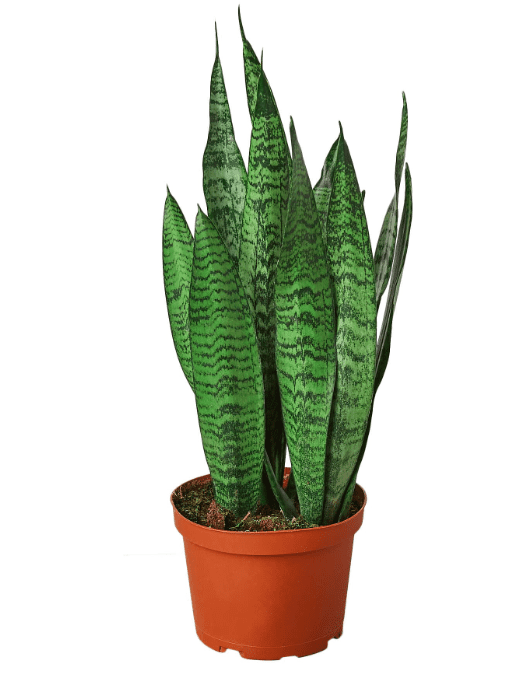
The Snake plant is an excellent houseplant for anxiety that is known for its medicinal benefits, including its ability to remove indoor air pollutants such as formaldehyde and benzene. It can also filter out impurities like xylene, trichloroethylene, toluene, and ammonia. During the night, the plant can remove up to 87% of these harmful toxins. In addition to this, the snake plant is capable of reducing the level of nitrate ions present in the air.
The Snake Plant is also great for producing an abundance of oxygen, which can improve the mood and energy levels of those in the room, making it an excellent addition to any lifeless or stressful space.
Caring for a snake plant (or any plant) has shown to benefit your sense of self-love and give a sense of purpose, ultimately reducing anxiety and stress levels.
Here’s a quick recap:
- Remove indoor air pollutants, such as formaldehyde and benzene, and filter out impurities like xylene, trichloroethylene, toluene, and ammonia
- Remove up to 87% of harmful toxins at night
- Reduce the level of nitrate ions
- Improve the mood and energy levels of those in the room
10. Money Plant Reduces Arguments and Anxiety
Money plants are also great air purifiers, removing harmful toxins such as benzene, toluene, xylene, and formaldehyde from the air. They even continue to produce oxygen at night, making them ideal for bedrooms. Another benefit of money plants is that they can clean aquarium water by absorbing nitrates from the water. This helps improve the quality of the water and makes for a nicer environment for fish too (if you have them).
Money plants can also have a positive effect on mental health. Studies found that interacting with plants can reduce anxiety and stress, with the majority of subjects reporting feelings of comfort and soothing. Viewing a money plant for just 5 minutes has been found to encourage psychological and physiological relaxation among older adults.
While some benefits of money plants are based on science, others are based on symbolism and beliefs, such as Feng Shui. For example, Feng Shui experts suggest placing a money plant in front of a sharp corner or angle to reduce anxiety. Others believe this houseplant for anxiety can assist with preventing arguments and sleep disorders.
Snake plants are not pet-friendly.
11. Parlor Palm Removes Anxiety-Causing Toxins
The parlor palm offers a multitude of benefits for mental health, from improving air quality to adding style to their living spaces. The plant boasts nine key benefits, including filtering indoor air, releasing oxygen, improving mental health, removing harmful toxins, creating humidity, being safe for pets, being effective against allergies, adding subtropical style, and requiring low maintenance.
Research studies have shown that parlor palms and other indoor palm varieties effectively remove carbon dioxide and carbon monoxide from the air, creating clean air in the home. The plant also releases oxygen and removes toxins, resulting in improved mental health and increased productivity. Additionally, the parlor palm is effective in removing harmful particles such as formaldehyde, benzene, and ammonia from the air, making it a valuable addition to any home.
The plant also releases water vapor, creating humidity in the home, which can promote better sleep and work performance while reducing the chances of viral infections. Furthermore, the parlor palm is safe for pets, unlike some of the other houseplants for anxiety, and can be beneficial for allergy sufferers, as it filters the air and humidifies the home, reducing the risk of allergic reactions.
The parlor palm also adds a touch of sophistication to any living space with its lush foliage and subtropical style, making it a popular choice. It also plant is low-maintenance and requires little care, making it an ideal choice for busy homeowners who want to enjoy the benefits of indoor plants without a lot of upkeep.
Here’s a quick recap:
- Filters indoor air
- Releases oxygen
- Improves mental health
- Removes harmful toxins
- Creates humidity
- Safe for pets
- Effective against allergies
- Adds subtropical, sophisticated style to your home
- Low maintenance
Parlor palms (also known as Chamaedorea elegans) are generally considered non-toxic to both dogs and cats.
12. Aloe Vera Plant Promotes Natural Healing and Anxiety Relief
One of my favourite houseplants for anxiety is aloe vera because it’s nearly impossible to kill and it has so many useful healing properties. Aloe vera is commonly used as a herbal remedy, as it contains healthful plant compounds that are beneficial to the body. They can be used to treat all kinds of health concerns, such as burns, acne, digestive issues, inflammation and oral health, while also purifying the air drastically. With this stress relieving plant in your bedroom or around your home, you can eliminate worry and stress from your mind, body, and spirit simply by getting the breath of fresh air that it brings, right to your indoors.
Here are some benefits of aloe vera you can expect:
- Has antioxidant and antibacterial properties that help inhibit the growth of certain bacteria that can cause infections in humans.
- Effective topical treatment for first and second-degree burns and may help heal other types of wounds.
- Reduce dental plaque and canker sores.
- Help treat constipation.
- Slow aging of the skin and improve skin integrity, which could benefit dry skin conditions.
- May enhance insulin sensitivity and help improve blood sugar management.
Other Calming Herbs for Anxiety and Depression
Calming plants and herbs for anxiety, like chamomile, rosemary, and valerian have been used for centuries for their soothing properties. These plants can be grown indoors and used to create calming teas or simply enjoyed for their aromatic benefits.
Certain plants, like St. John’s wort and passionflower, are also known for their ability to alleviate symptoms of both anxiety and depression. These plants can be grown indoors and used to create natural remedies that support mental health.
Some other plants for anxiety specifically, due to their ability to reduce anxiety include lavender, mint, and lemon balm. These plants have soothing scents and can be used in various forms, such as oils or herbal teas, to help manage anxiety symptoms.
Owning a Plant for Anxiety Relief
Something as simple as watering your plants or watching new growth can offer a moment of pause, a feeling of purpose, and a sense of calm. The therapeutic act of tending to something green can ground you, pulling you out of your head and back into the moment. Plus, plants are just good vibes all around.
How do houseplants improve mental health?
Houseplants improve mental health by reducing stress, lowering blood pressure, and promoting a sense of calm through their presence and the act of caring for them.
Can indoor plants really help with anxiety and depression?
Yes, certain indoor plants have properties that can alleviate symptoms of anxiety and depression by improving air quality, reducing stress, and providing a sense of purpose.
What are some easy-to-care-for plants that help with anxiety?
Snake plants, aloe vera, and spider plants are easy-to-care-for options that offer significant mental health benefits.
Additional Resources
At Anxiety Gone, we believe in healing together. We’ve partnered with trusted wellness organizations to bring you the most effective tools, insights, and support. Some links may earn us a commission — always at no extra cost to you.
Join The Club
Connect with our private self-care community for daily support, exclusive tips, and inspiration. Join us today
Talk Therapy
Get matched with licensed therapists online through BetterHelp and begin your healing today. Start now
Hims/Hers
Receive personalized, affordable mental health care + medication from home — no insurance required. Learn more
Mental Health, Right to your Inbox
Subscribe to our newsletter for a place to rest your mental health and find ways to support your journey. Sign up
Emotional Freedom Technique
Tap your way to calm with scientifically backed stress relief. Our readers receive a 14-day free trial! Try EFT now
Mindfulness App
Access 2,000+ guided practices to support your mental health wherever you are + exclusive discount when you upgrade Try it
Online Breathwork
Experience calm and reset your nervous system with guided sessions and receive your first month free . Get started
Find a Helpline
If you need immediate support, visit our directory to find help near you. See helplines
Infographics about Calming Plants for Anxiety
